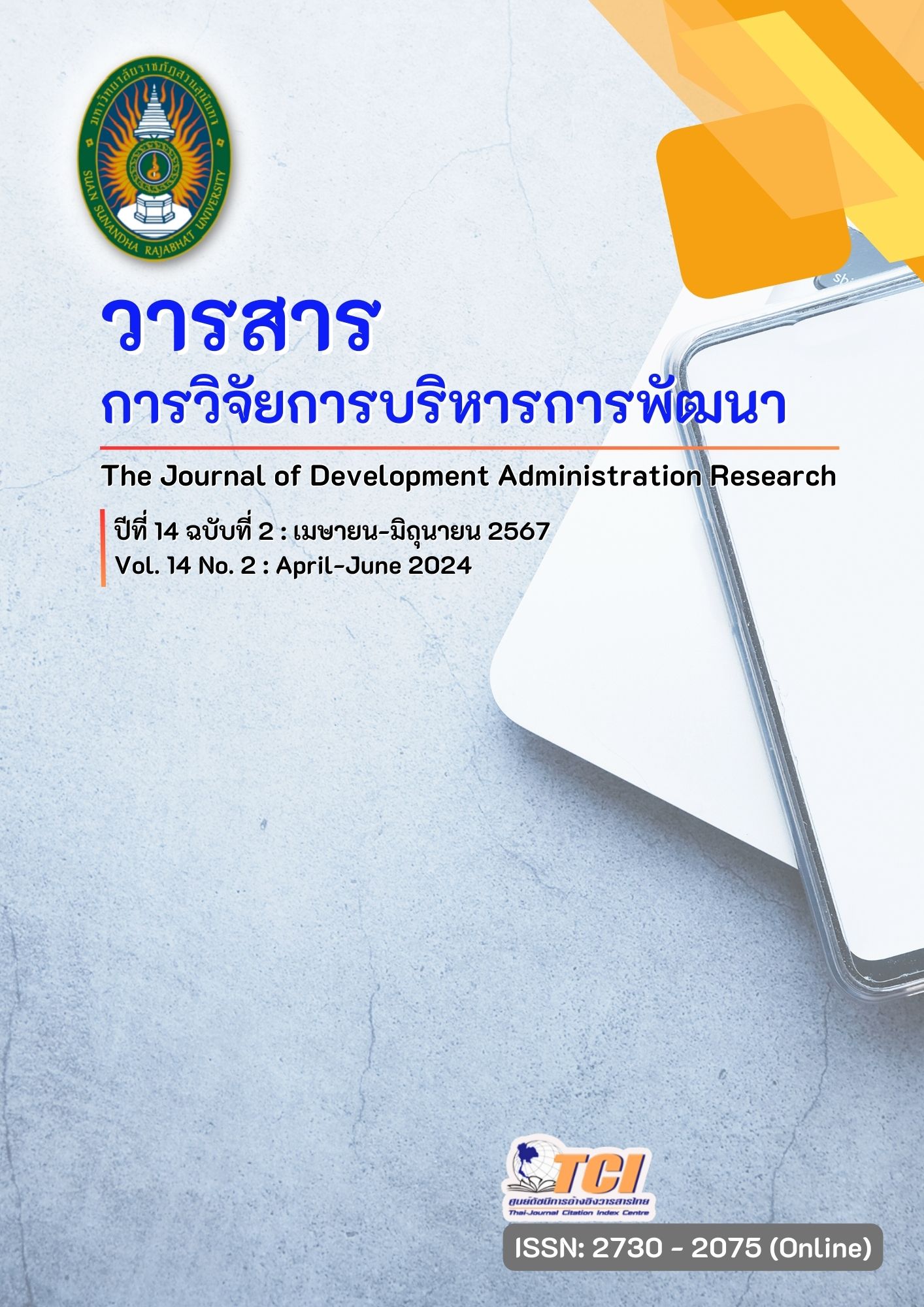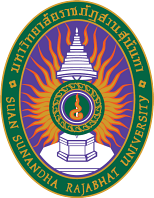Attributes and Skills Required for Potential Employment of Graduates: A Survey in the Context of the Labour Market in Bangkok
คำสำคัญ:
Attribute, Skills, Potential Employability, Graduates, Labour Marketบทคัดย่อ
Our objectives were threefold: 1) to determine the expectations and perceptions of students, lecturers, and entrepreneurs regarding key employability attributes and skills of graduate students, 2) to encourage students to recognise and cultivate key employability skills and attributes to align their attributes and skills with the demands of the labour market, and 3) to encourage higher education institutes to recognise these skills and attributes and design proper and overarching curricula and teaching resources for students. This study was quantitative research. Data for this quantitative research were collated from questionnaires and interviews involving 549 students, 97 lecturers, and 90 entrepreneurs in Bangkok. Statistical analysis was performed using means and standard deviation to define key components of employability attributes (morals and ethics, emotional intelligence, work performance and effectiveness, and personality) and skills (interpersonal skills, critical thinking, professionalism and management skills, and language and information technology skills).
Our results found that: 1) Lecturers and entrepreneurs have emphasised the importance of intelligence and interpersonal skills in graduates. Students, on the other hand, perceive personality, language proficiency, and information technology skills as crucial for employability. Additionally, students consider their expected work performance, effectiveness, and interpersonal skills to be key attributes of employability. 2) Expectations of entrepreneurs and lecturers regarding employability skills and attributes should be shared with students, a knowledge with which they might be able to improve their attributes and skills to align them with the requirements of the labour market. 3) University curricula and teaching resources should be designed to equip graduates with the requisite skills and attributes to satisfy labour market expectations. Students must be encouraged to participate in a cooperative education programme, which can help them gain pertinent knowledge and experience.
เอกสารอ้างอิง
Baker, C., et al. (2017). Sports graduate capabilities and competencies: a comparison of graduate and employer perceptions in six EU countries. European Journal for Sport and Society, 14(2), 95–116.
Baruch, Y. (2001). Employability: a substitute for loyalty? Human Resource Development International, 4(4), 543–566.
Berntson, E., Sverke, M., & Marklund, S. (2006). Predicting perceived employability: human capital or labour market opportunities? Economic and Industrial Democracy, 27(2), 223–244.
Boocha P. & Janyarat S. (2022). A Study of Thailand 4.0 Undergraduate Student’s Essentials. Ratchaphruek Journal, 20 (2). 99–112.
Brown, P., Hesketh, A., & Wiliams, S. (2003). Employability in a knowledge-driven economy. Journal of education and work, 16(2), 107–126.
Cassidy, S. (2006). Developing employability skills: Peer assessment in higher education. Education+training, 48(7), 508–517.
Charaum, S., & Areesophonpichet, S., (2016). Tourism Employability Attribute Development Model. Journal of Multidisciplinary in Social Sciences, 12(1), 7–26.
Chokchaiworarat, S. Supichayangkool, S. & Lertbhuddaruk, S. (2021). The Skill Gap of Industrial Worker with High Vocational Level for Automotive Industry in Eastern Economic Corridor. KKBS JOURNAL of Business Administration and Accountancy, 5(2). 97–121.
Chorkaew, S. (2014). Human Resource Development Interventions and Employability Enhancement: A Perspective of the Thai Public Sector on Government Employees. NIDA Development Journal, 54(2), 31–66.
Crosman, P. (2017). All the ways AI will slash Wall Street jobs. American Banker, 182(52), 1.
Curtis, D. C., & McKenzie, P. (2002). Employability skills for Australian industry: Literature review and framework development. Department of Education, Science and Training. https://research.acer.edu.au/transitions_misc/42
Dacre Pool, L., & Sewell, P. (2007). The key to employability: developing a practical model of graduate employability. Education+ training, 49(4), 277–289.
Daga, V. (2022, November, 19). Impact of AI on Future Job Roles. The times of India. https://timesofindia.indiatimes.com/blogs/voices/impact-of-ai-on-future-job-roles/
Fajaryati, N., Budiyono, Akhyar, M., & Wiranto, W. (2020). The employability skills needed to face the demands of work in the future: Systematic literature reviews. Open Engineering, 10(1), 595–603.
Fay, R. & Trenholm, W. (2019, April,2). The Cyber Security Battlefield. Centre for International Governance Innovation. https://www.cigionline.org/articles/cyber-securitybattlefield/?utm_source=google_ads&utm_medium=grant&gclid=Cj0KCQjw9deiBhC1ARIsAHLjR2Cmt2IsdAK3A9ZvdhDy9pPbfexrsVKuSIM26nTDDjhhx8bfVcCdREaAsbaEALw_wcB
Fugate, M., Kinicki, A. J., & Ashforth, B. E. (2004). Employability: A psycho-social construct, itsdimensions, and applications. Journal of Vocational behavior, 65(1), 14–38.
Garavan, T. (1991). Strategic human resource development. Journal of European Industrial, 15(2), 17–30.
Guilbert, L., Bernaud, J. L., Gouvernet, B., & Rossier, J. (2016). Employability: review and research prospects. International Journal for Educational and Vocational Guidance, 16, 69–89.
Groot, W., & Maassen van den Brink, H. (2000). Education, training and employability. Applied economics, 32(5), 573–581.
Hager, P., Holland, S., & Beckett, D. (2002). Enhancing the learning and employability of graduates: The role of generic skills. Melbourne: B-Hert Position Paper.
Harrison, R., & Kessels, J. (2004). Human Resource Development in a Knowledge Economy: An Organizational View. New York: Palgrave Macmillan.
Harvey, L. (2001). Defining and measuring employability. Quality in higher education, 7(2), 97–109.
Hawser, A. (2019). Reimagining the world of work. (Cover story). Global Finance, 33(2), 12–16.
Hillage, J. and Pollard, E. (1998). Employability: Developing a Framework for Policy Analysis. Department for Education and Employment. London: Department for Education and Employment.
Hinchliffe, G. W., & Jolly, A. (2011). Graduate identity and employability. British Educational Research Journal, 37(4), 563–584.
Jesuthasan, R. (2017). HR’s new role: rethinking and enabling digital engagement. Strategic HR Review, 16(2), 60–65.
Knight, P. T., & Yorke, M. (2003). Employability and good learning in higher education. Teaching in Higher education, 8(1), 3–16.
Kiderlin, S. (2023, February 20). Artificial Intelligence is booming – but how will it impact your career?. https://www.cnbc.com/2023/02/20/artificial-intelligence-is-booming-but-will-it-impact-your-career-and-job.html
Lijun. J. (2007). Structure of College Students’ Employability. Nanjing Normal University.
McGoldrick, J., Stewart, J., & Watson, S. (2002). Understanding Human Resource Development: A Research-Based Approach. New York: Routledge.
McGrath, M. (2021, March 10). How AI Will Impact the Future of Work and Life. Forbes. https://www.forbes.com/sites/ashleystahl/2021/03/10/how-ai-will-impact-the-future-of-work-and-life/?sh=62c89cfc79a3
McQuaid, R.W. & Lindsay, C. (2005). The Concept of Employability, Urban Studies 42(2). 197–219.
Misni, F. and Mahmood, N. H. and Jamil, R. (2020). The effect of curriculum design on the employability competency of Malaysian graduates. Management Science Letters, 10 (4), 909–914.
Nair, C. S., Patil, A., & Mertova, P. (2009). Re-engineering graduate skills–a case study. European journal of engineering education, 34(2), 131–139.
Ngotngamwong, R. (2020). A Study of Millennial Job Satisfaction and Retention. Human Behavior, Development & Society, 21(3). 47–58.
Office of the Higher Education Commission, Ministry of Education. (2017). Thai Qualifications Framework for Higher Education BE 2552. at: http://www.mua.go.th/users/tqf-hed/
Office of the National Economic and Social Development Council (NESDC). (n.d.). Thailand Social’s Outlook of Q4/2022 and overview of 2022. https://www.nesdc.go.th/nesdb_en/ewt_dl_link. php?nid=4495&filename=social_dev_repor
Office of the National Economic and Social Development Council (NESDC). (n.d.). Thailand’s Social Outlook of Q2/2023. https://www.nesdc.go.th/ewt_dl_link.php?nid=13635& filename=socialoutlook_report
Pegg, J. (2023, November 7). 70+ TOP AI STATISTICS 2023-24. Findweb3.com. https://findweb3.com/posts/aistatistics?gclid=Cj0KCQjw9deiBhC1ARIsAHLjR2AcykUwWW9TcxgVunwiBsafL3NM9qt6RRomwUqSbTgrTyqYet6qCB4aAvsFEALw_wcB
Puriwat, W., & Tripopsakul, S. (2020). Preparing for Industry 4.0 – Will youths have enough essential skills?: An Evidence from Thailand. International Journal of Instruction, 13(3), 89–104.
Rochanasak S. et al. (2019). Essential Skills for Thailand 4.0: The Importance of Education Corresponded to Employment Scenarios, and Building Self-Competent Immunity Pertaining to Technological Disruptions. Humanities, Social Sciences and Arts, 12(3). 68–85.
Rodyim, C. (2013). Employment Situation and the Degree of Public and Private Sector in Thailand. Phranakhon Rajabhat Research Journal,8(1),156–167.
Rufai, A. U., & Rashid, A. B. M. (2015). Developing a sustainable practical model of graduate employability for higher education. International Journal of Education and Literacy Studies, 3(1), 42–51.
Saong, M., Bonifacio, J. & Gili, K.R. (2023). The Role of Higher Education Curriculum in the Employability of Health Sciences Graduates. International Journal of Academe and Industry Research, 4 (3), 82–104.
Sinlapaprasert, S.& Wongkalasin, H., (2021). Factors Affecting the Employment of New Graduates For Public Companies in Thailand during Covid-19 Pandemic. Journal of Roi Kaensarn Academi, 6(11), 235–241.
Srisangkaew, K. (2018). The Gap Analysis of Employability Competency in 4 to 5 Star Hotels, Bangkok from the Perspective of Hospitality Industry Stakeholders. Dusit Thani College Journal,12(3). 166–184.
Tejavanija, C. (2002, July, 29). The Ideal Curriculum for Hospitality and Tourism & Tourism Management, Inter-University Conference on “Vision 2020 Revisited” organized, Association of Southeast Asian Institutions of Higher Learning of Thailand (ASAIHL) RangsitUniversityonJuly.
Thijssen, J.G.L., Heijden, B.I.J.M., & Rocco, T.S. (2008). Toward the employability–link model: Current employment transition to future employment perspectives. Human Resource Development Review, 7(2), 165–183.
Thomas, B. A., & Unninarayanan, Dr. K. V., (2018). A study on employability skills of MBAstudents from the management institutes in the state of Kerala. International Journal of Current Research and Modern Education, 3(1), 318–324.
Wedchayanon, N. (2011). Enhancing Employability in Challenging Times: The Case of Thailand. NIDA Case Research Journal, 3(1), 167–190.
Whiting, K. (2020, October, 21). These are the top 10 job skills of tomorrow – and how long it takes to learn them. https://www.weforum.org/agenda/2020/10/top-10-work-skills-of-tomorrow-how-long-it-takes-to-learn-them/
Wood, D. (2003). Hospitality Management Skills: An Educational and Workplace Comparative Analysis(Master’s Thesis). University of Wisconsin-Stout.
ดาวน์โหลด
เผยแพร่แล้ว
รูปแบบการอ้างอิง
ฉบับ
ประเภทบทความ
สัญญาอนุญาต
ลิขสิทธิ์ (c) 2024 วารสารการวิจัยการบริหารการพัฒนา

อนุญาตภายใต้เงื่อนไข Creative Commons Attribution-NonCommercial-NoDerivatives 4.0 International License.
บทความที่ได้รับการตีพิมพ์เป็นลิขสิทธิ์ของมหาวิทยาลัยราชภัฏสวนสุนันทา
ข้อความที่ปรากฏในบทความแต่ละเรื่องในวารสารวิชาการเล่มนี้เป็นความคิดเห็นส่วนตัวของผู้เขียนแต่ละท่านไม่เกี่ยวข้องกับมหาวิทยาลัยราชภัฏสวนสุนันทา และคณาจารย์ท่านอื่นๆ ในมหาวิทยาลัยฯ แต่อย่างใด ความรับผิดชอบองค์ประกอบทั้งหมดของบทความแต่ละเรื่องเป็นของผู้เขียนแต่ละท่าน หากมีความผิดพลาดใดๆ ผู้เขียนแต่ละท่านจะรับผิดชอบบทความของตนเองแต่ผู้เดียว




